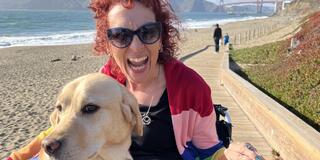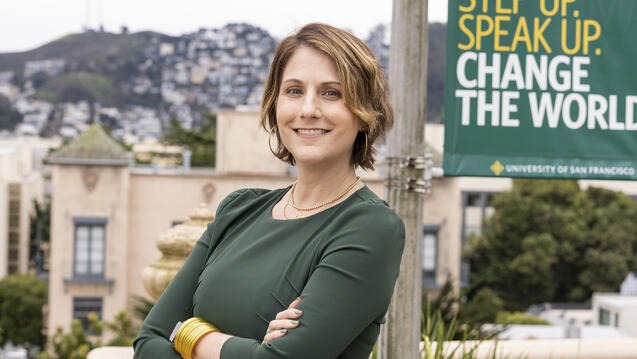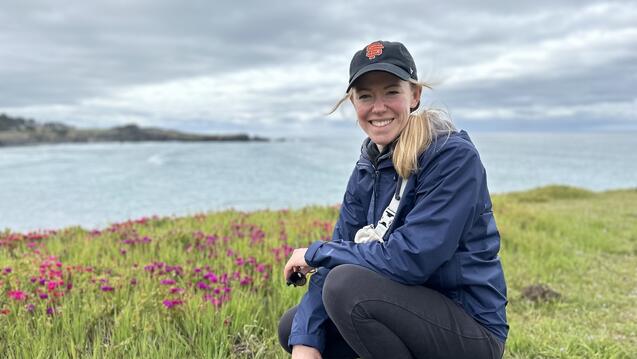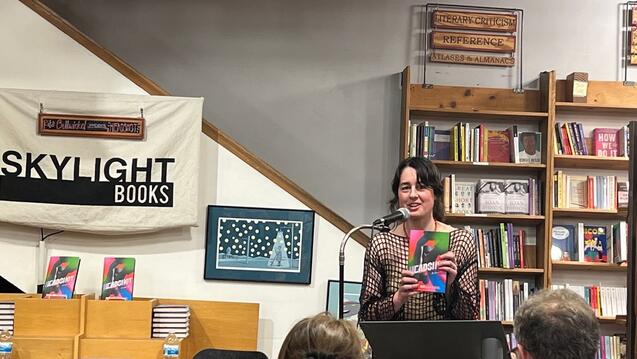Meet Your Professor: Alette Coble-Temple

The associate professor, program director, and licensed clinical psychologist talks about life with cerebral palsy, defying expectations, and an “aha” moment in Louisiana’s bayou country.
Which courses do you teach?
This fall, I’ll be teaching the Clinical Dissertation Proposal, Clinical Dissertation Seminar, and Full-Time Clinical Internship courses.
What brought you to USF?
Prior to USF I taught at JFK University at National University for 18 years. It was easy, it was comfortable, it was a five-minute commute from home. But I went to a Jesuit university [Santa Clara] for undergrad, and I yearned to return to an institution valuing both research and social justice. I have cerebral palsy (CP), and my life revolves around disability advocacy. USF offered me more of an opportunity to make a difference.
In what way?
Well, you can’t be what you can’t identify. Note that I don’t say “what you can’t see,” because that’s ableist language. A huge issue in disability communities is that there are so few mentors in leadership roles, people you can point to as being an example of where you want to go in life. At my last university, I was never approached by administration to take on a leadership role. But I came to USF in 2022, was offered tenure in 2023, and was appointed director of the Clinical Psychology, PsyD program in January of 2024. USF gave me the platform to be an example for students who might otherwise have thought a position of academic leadership was out of reach for them due to disability.
How do you use that platform?
An important project for me was launching the first Disability Pride identity group at USF in September 2023. Before the group, students with disabilities who attended USF had a quieter existence on campus, and were understandably protective of their disability identity. That’s changing, and we hosted the first disability art exhibit in March of this year, featuring the students who are embracing and showcasing their disability identity. That was wonderful to see.
Was there a moment when you consciously decided to embrace your own disability identity?
I remember it clearly. When I was 5 years old my parents took me to a psychologist who pronounced me “profoundly retarded.” My speech was affected by my cerebral palsy, and it wasn’t easy at first to understand me. It was labeled as an impediment that I had to fix — which also meant, to me, that it was something I had to apologize for. My parents, thankfully, didn’t buy into any of it. I was so lucky to have parents who expected me to do well.
It was later, doing advocacy in the backwaters of rural Louisiana, that I had a light bulb experience. I could not understand some individuals, who spoke with thick Cajun accents. And all of a sudden I realized — they weren’t being classified as people with speech impediments. They didn’t have to spend hours of their lives in speech therapy to “correct” how they spoke. And so from then on I decided to flip the script. Now, I say that I have a CP accent, and if you need me to repeat myself, just ask. Chances are, like those with Cajun accents, within about 15 minutes your ears will adjust.
Any advice to incoming students with disabilities?
First and foremost, if you get into USF, you deserve to be here. And that means you deserve to access all the services and all the relationships that USF has to offer. Students from diverse communities are statistically less likely to go talk to their professors or access disability services because there’s a stigma — don’t let that stop you! Build connections and foster relationships with faculty, staff, and your peers.
Lastly, know that you come into a program — on your very first day at USF, no matter where you are academically — with knowledge. And we know from research that we need to learn from each other. If you are open to that, you will experience the transformation that is the goal of a college education.


